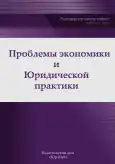Overlapping of Intellectual Property Rights in Cross-border Legal Relations: Practical Aspects of Protecting the Right Holder
- Authors: Blinov I.S.1
-
Affiliations:
- Kutafin Moscow State Law University (MSAL)
- Issue: Vol 18, No 5 (2022)
- Pages: 108-114
- Section: Articles
- URL: https://journal-vniispk.ru/2541-8025/article/view/147350
- ID: 147350
Cite item
Abstract
Objective. Cases of infringement of exclusive rights today take place not only within the state where protection is sought, but also on the territory of several states at the same time. This situation does not correlate with the basic substantive legal postulate on the territorial nature of exclusive rights. In addition, the duality of intellectual property objects can give rise to the problem of the overlapping of intellectual property rights. As a result, the courts have difficulty establishing the law applicable to the dispute on the protection of exclusive rights. The practice of law enforcement in this area is fragmented, which is due to a differentiated approach to the formulation of conflict rules and a fragmentary study of significant aspects. The foregoing makes the topic of this study relevant in modern conditions, in view of the trend of digitalization and the systematic overcoming of the territorial isolation of intellectual rights. Methodology of the research. Within the framework of this study in the field of intellectual property rights in Russia and foreign countries, such general scientific research methods as dialectical, logical and system methods were used. Conclusions. The author identifies problems, faced by the law enforcer, following the concept of territoriality of exclusive rights in the plane of human rights activities. The conditional nature of the expression «international protection of intellectual property» is substantiated. The most important issues of substantive law and conflict of law regulation in the field of protection of exclusive rights are analyzed. With reference to the practice of law enforcement, emphasis is placed on the points that require priority consideration by right holders in order to avoid further problems in case of violation of their rights in cross-border relations. The problem of the intersection of intellectual property rights and the need for its study are indicated. Based on the results of the analysis of the regulatory legal framework of Russia and foreign countries, the conclusion is made about the inevitable transformation of the concept of territoriality in today's conditions with bright trends of globalization and digitalization. Originality/value. This article is of practical importance for lawyers working in the field of intellectual property law, as it considers the issues of cross-border trade in intellectual property objects from the standpoint of resolving disputes with these objects, in addition, within the framework of this study, problems of legal regulation of certain issues of protection of objects of intellectual property.
About the authors
Ivan S. Blinov
Kutafin Moscow State Law University (MSAL)
Email: 4isb@mail.ru
PhD student of the Department of Private International Law Moscow, Russian Federation
References
- Malygina, A.N. Indirect patent infringement in German law // Journal of the Intellectual Property Rights Court, No. 26, December 2019, pp. 75-82.
- Ivanov, N.V. Settlement compensation for violation of an exclusive right in the form of a two-fold cost of the right of use // Journal of the Intellectual Property Rights Court, No. 1 (31), March 2021, pp. 80-95.
- Boguslavsky, M.M. International Private Law: textbook / M.M. Boguslavsky. -7th ed., reprint. and add. -Moscow: Norma: INFRA-M, 2022. 867 p.
- Inshakova, A.O. International private law: textbook and workshop for universities / A.O. Inshakova-va. -2nd ed. -Moscow: Yurayt Publishing House, 2022. -746 p.
- Krupko, S. Conflict-of-laws aspects of intellectual property regulation // Economy and law. 2020. No. 11. pp. 15-26.
- Lutkova, O.V. Conflict regulation in determining the author of a work in cross-border relations // Journal of Foreign Legislation and Comparative Law. 2019. No.5. pp. 45-53
- Lutkova, O.V. Special conflict-of-laws principles of regulation of cross-border copyright relations // Lex Russica. 2019. No. 23. pp. 67-78.
- Pirtskhalava, H.D. On some aspects of legal regulation of intellectual property objects in the Russian Federation and foreign countries // International cooperation of Eurasian states: politics, economics, law. 2019. No.4. pp. 78-87.
- Sagdeeva, L.V. Issues of extraterritoriality of exclusive law on the example of US law // Journal of Foreign Legislation and Comparative Jurisprudence. 2020. No. 2. pp. 125-137.
- Suspitsyna, M.V. Conflict regulation of intellectual property relations: abstract. dis. ... cand. jurid. M., 2013. 35 p.
- Shakhnazarov, B.A. Territorial principle of intellectual property protection and the effect of state sovereignty in the digital space // Lex Russica. 2018. No. 12 (145). pp. 132-143.
Supplementary files








